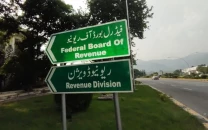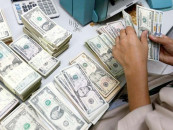The cry for tax reforms
Tax policies should be based on the principles of equity and fairness, and must facilitate economic growth

The writer is a Cambridge graduate and is working as a management consultant. He tweets @c1ue
So how can the Ishaq Dar regime possibly defend the newly imposed tax on banking transactions? One possible way could be to indulge in the rhetoric of the following kind: the inflation rate is ‘down’, the budget deficit is ‘down’, the shortfall from the GDP target growth rate is ‘down’, so it’s high time that non-taxpayers were brought ‘down’ on their knees too! On a serious note, it is claimed that the new policy will help widen the tax net by penalising non-filers. Legally speaking, non-filers can always adjust the advance tax paid when they file their annual returns so the government is not expected to generate any extra revenues. So the question of the hour is: will this policy really work?
The unintended consequence of this policy will be that a large chunk of Pakistan’s economy will move ‘off the books’. More transactions will be made in cash and no taxes shall be collected. The government would most probably miss its target GDP and the banks would start losing their deposits as consumers already have little incentive to maintain large deposits due to declining interest rates. The underground economy will grow, something the government does not want to happen amid its crackdown on terrorists under the umbrella of the National Action Plan. Augmentation of revenues is crucial and in order to maximise them, the leadership needs to reform the tax system, but not in the manner that it is adopting right now. Historically, we, as a people, are not conditioned to pay taxes so it will take a great deal of effort in changing the mental models of the public. The government needs to employ a new policy mix by offering some incentive to non-filers. For example, what about offering some tax credits to first-time filers and occasionally offering bonus tax credits to regular filers?
The government’s Vision 2025 documents states that “we need a tax-to-GDP ratio of 16-18 per cent,” which seems to be an uphill task. The manufacturing sector that contributes over 10 per cent to the GDP results in more than 50 per cent of tax collections, while the agriculture sector which contributes more than 20 per cent to our GDP, accounts for less than one per cent in tax revenues. This gross inequality, fuelled by the landed elite, discourages industrialists and traders to file tax returns. Moreover, the corporate tax rate of 34 per cent is also one of the highest in the world.
Tax policies should be based on the principles of equity and fairness, and must facilitate economic growth. In the design of new policy instruments, a holistic approach should be employed with efforts made not only to look at the fiscal and economic impacts, but also the unintended behavioural and social consequences. Policymakers need to use a policy tunnelling approach by using computer simulation models to estimate the efficiency of our tax system under various policy scenarios and then conduct a thorough debate in the two houses of parliament before approving any new tax reforms.
Published in The Express Tribune, July 25th, 2015.
Like Opinion & Editorial on Facebook, follow @ETOpEd on Twitter to receive all updates on all our daily pieces.


















COMMENTS
Comments are moderated and generally will be posted if they are on-topic and not abusive.
For more information, please see our Comments FAQ